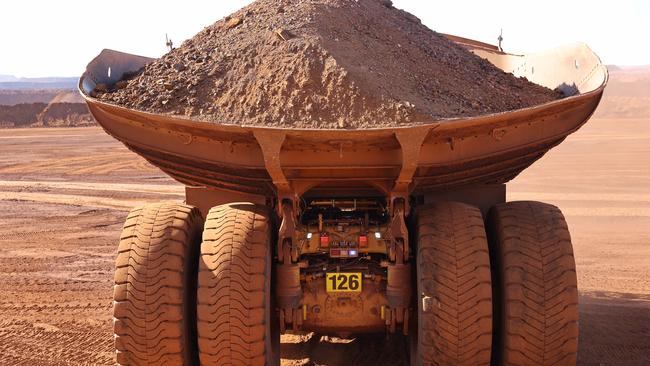Miners lash Anthony Albanese on MYEFO outlook
As forecast commodity export earnings are slashed by $100bn, miners have called for support against ‘existential’ threats.

Lobby groups representing Australia’s biggest miners have hit out at Albanese government policy settings with forecasts for sharp falls in commodity prices factored into a $22bn budget blowout revealed by Treasurer Jim Chalmers.
Chamber of Minerals and Energy WA chief executive Rebecca Tomkinson said: “Harmful policy is no longer just a handbrake on the growth of industry – for some commodities it is now an existential threat.”
Falling commodity prices translated to the budget plunging from consecutive surpluses into a deficit of $26.9bn for 2024-25 with more pain predicted amid doubts about the Chinese economy and iron ore miners facing the prospect of increasing supply out of Africa and Brazil.
The Commonwealth Mid-Year Economic and Fiscal Outlook (MYEFO) slashed forecast mining export earnings by $100bn over the next four years in a reflection of softening demand for Australian product as competing jurisdictions ramp up production.
The updated accounts show commodity prices declining from elevated levels over four quarters to the end of the September 2025. The grim forecasts on include the iron ore spot price falling to $US60 a tonne free-on-board, the metallurgical coal spot price to $US140 a tonne, the thermal coal spot price to $US70 a tonne, and the LNG spot price to $US10m British thermal units (MMBtu).
Iron ore slumped by more than 30 per cent from the start of this year with the benchmark price slipping below $US90 a tonne in September before recovering to sit comfortably above $US100 a tonne.
Analysts expect the iron ore price will weaken in 2025 and through to the end of 2030.
Over the next four years, the federal budget is expected to be $143.9bn in the red – almost $22bn more than projected in May – and with BHP and Rio Tinto in agreement that Chinese demand for iron ore has peaked.
Ms Tomkinson said the forecast hit to mining exports was expected to result in the Commonwealth receiving $8.5bn less in corporate tax over the forward estimates.
“When the resources sector struggles, Australia struggles,” she said.
“The strong headwinds buffeting industry are reflected in the nation’s fiscal position.
“These downgrades must act as a wake-up call for the Commonwealth government to the substantial challenges confronting WA’s resources sector.”
The CME, whose members include BHP, Rio, Fortescue, Newmont and Woodside Energy, continues to push for the repeal of key aspects of recent industrial relations changes, including involuntary multi-employer bargaining, the “intractable bargaining regime” and allowing unions to force bargaining without employee support.
“Disconnecting wage rises from productivity gains and opening the door to widespread industrial action has substantially increased investment risk,” Ms Tomkinson said.
Ms Tomkinson said uncertainty over the future of nature positive legislation was also hurting business confidence.
“CME continues to support reforms that are better for the environment and better for business but the proposed nature positive laws as currently drafted achieve neither objective,” she said.
The mid-eay accounts underline how dependent the budget bottom line is on iron ore prices with a $US10 per tonne increase on the forecast price increasing nominal GDP by about $4.7bn in 2024–25, rising to about $9.8bn in 2027–28.
Deloitte Access Economics partner Stephen Smith noted that since the early 2000s, cyclically serendipitous commodity price booms had papered over fiscal cracks and allowed successive governments to ignore a worsening structural deficit.
Rio is banking on its high grade Simandou iron ore project in Guinea for growth amid a review of the product strategy for its cash cow iron ore mines in WA, where the company has complained of approval delays.
Meantime, BHP is set to rely on its iron ore operations to help pay for growth ambitions in so-called future-facing commodities like copper in South America and potash in Canada.




To join the conversation, please log in. Don't have an account? Register
Join the conversation, you are commenting as Logout